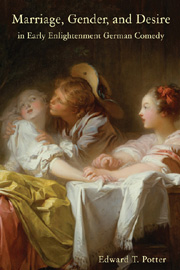Book contents
- Frontmatter
- Contents
- Acknowledgements
- List of Abbreviations
- Introduction: Comedy, the Sentimental Marriage, and Modes of Resistance
- 1 Promoting the Sentimental Marriage in Theory and in Practice
- 2 The Virgin Huntress Tamed: J. C. Gottsched's Atalanta and the Erasure of Female Autonomy
- 3 Marriage Brokering at the Expense of Economics: C. F. Gellert's Die zärtlichen Schwestern
- 4 The Clothes Make the Man: J. E. Schlegel's Der Triumph der guten Frauen
- 5 Cross-Dressing and Gender Performance in G. E. Lessing's Der Misogyne
- 6 Sickness Masks Desire in Th. J. Quistorp's Der Hypochondrist
- Conclusion
- Works Cited
- Index
2 - The Virgin Huntress Tamed: J. C. Gottsched's Atalanta and the Erasure of Female Autonomy
Published online by Cambridge University Press: 05 February 2013
- Frontmatter
- Contents
- Acknowledgements
- List of Abbreviations
- Introduction: Comedy, the Sentimental Marriage, and Modes of Resistance
- 1 Promoting the Sentimental Marriage in Theory and in Practice
- 2 The Virgin Huntress Tamed: J. C. Gottsched's Atalanta and the Erasure of Female Autonomy
- 3 Marriage Brokering at the Expense of Economics: C. F. Gellert's Die zärtlichen Schwestern
- 4 The Clothes Make the Man: J. E. Schlegel's Der Triumph der guten Frauen
- 5 Cross-Dressing and Gender Performance in G. E. Lessing's Der Misogyne
- 6 Sickness Masks Desire in Th. J. Quistorp's Der Hypochondrist
- Conclusion
- Works Cited
- Index
Summary
Early Enlightenment German comedy viewed the figure of the unmarried woman who insisted upon her independence, a figure that could also be described as a marriage resister, as a serious challenge to the concept of the sentimental marriage. Although the sociohistorical situation of the mid-eighteenth-century “spinster” belies this view, since an unmarried woman of the period possessed little social prestige and had great difficulty eking out a living, the literary texts that form the focus of the next two chapters of this study are involved in the construction of the marriage resister as a challenge to the concept of the sentimental marriage. In J. C. Gottsched's Atalanta, oder die bezwungene Sprödigkeit (Atalanta, or vanquished aloofness, 1741) and in Gellert's Die zärtlichen Schwestern (The tender sisters, 1747), it becomes imperative that Gottsched's Atalanta and Gellert's Julchen integrate themselves into the institution of marriage. In these two plays, one encounters women of childbearing age whose autonomy displays resistance to the emerging sentimental marriage, resistance that is ultimately eradicated.
Atalanta and Julchen are not women who could not find a husband or who lacked the resources to marry; indeed, these two female characters are both actively sought by suitors. Since the women are of childbearing age, their refusal to channel their sexual potential into the institution of marriage represents a challenge to patriarchal society, which would have to support any illegitimate children they might produce; in addition, their refusal to marry calls the concept of the sentimental marriage radically into question.
- Type
- Chapter
- Information
- Publisher: Boydell & BrewerPrint publication year: 2012

